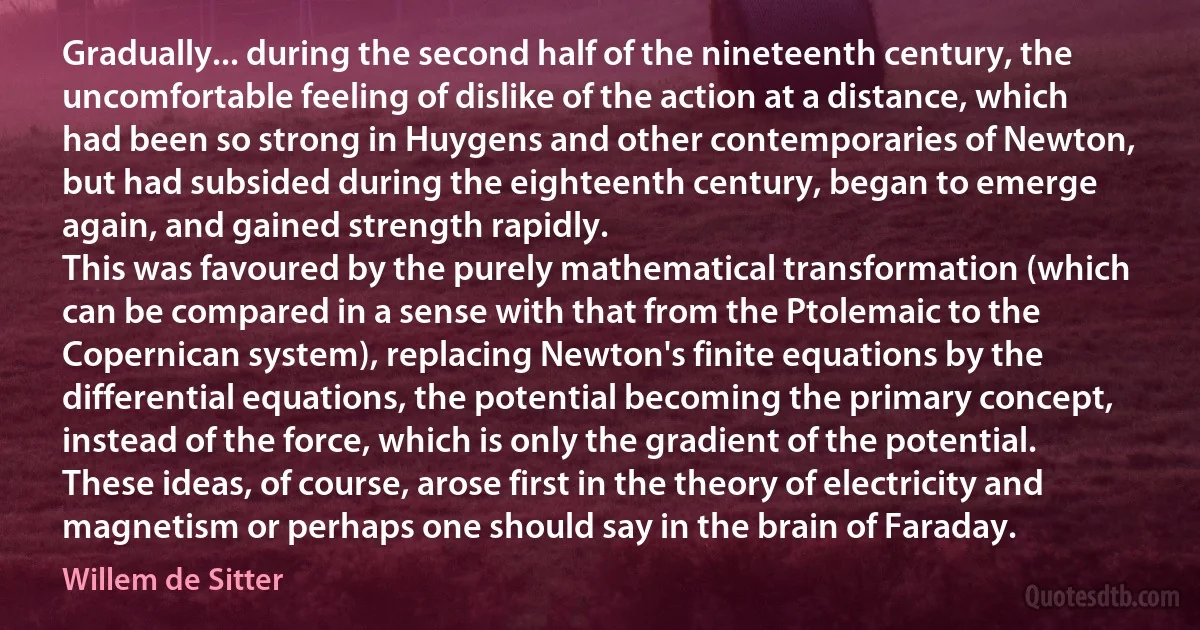
Gradually... during the second half of the nineteenth century, the uncomfortable feeling of dislike of the action at a distance, which had been so strong in Huygens and other contemporaries of Newton, but had subsided during the eighteenth century, began to emerge again, and gained strength rapidly. This was favoured by the purely mathematical transformation (which can be compared in a sense with that from the Ptolemaic to the Copernican system), replacing Newton's finite equations by the differential equations, the potential becoming the primary concept, instead of the force, which is only the gradient of the potential. These ideas, of course, arose first in the theory of electricity and magnetism or perhaps one should say in the brain of Faraday.
Willem de SitterRelated topics
action becoming begin brain century concept contemporaries copernican course differential distance eighteenth emerge force half magnetism nineteenth perhaps primary say second sense should strength transformation faraday newton replacingRelated quotes
We never fully understood why Milosevic decided to give Sarajevo to the Muslims. But in retrospect, the best explanation may be that he was fed up with the Bosnian Serbs and had decided to weaken their Pale base by giving away the Serb-controlled part of Sarajevo. By giving the Federation all of Bosnia's capital, perhaps Milosevic wanted to weaken Karadzic and stregthen the Serbs in other parts of Bosnia, especially Banja Luka. This explanation was consistent with one of Milosevic's main themes at Dayton: that the Bosnian Serb leadership had become an impediment, even though he had earlier made common cause with them. Milosevic had often talked of strengthening the "intellectuals" and businessmen of Banja Luka in order to weaken Pale; now he seemed to be putting his theory into action.

Richard Holbrooke
We analyzed the first stage of our construction, confined to two-dimensional space, and found it to be as durable and resistant as the earth itself. We build in this space just as we would on the ground, and therefore must take as our point of departure the concepts of gravity and force of attraction, as the foundation of everything built on the land. In PROUN the reciprocity of the effects of gravity [Newton, 'for every action an equal and opposite reaction'] manifests itself in a new capacity. We see that on the surface (plane) of the picture, the PROUN ceases to exist as such and becomes a building surveyed from every direction - considered from above or examined from below. The result of this turns out to be the destruction of the single axis that leads to the horizon.

El Lissitsky
The distribution of wealth is one of today's most widely discussed and controversial issues. But what do we really know about its evolution over the long term? Do the dynamics of private capital accumulation inevitably lead to the concentration of wealth in ever fewer hands, as Karl Marx believed in the nineteenth century? Or do the balancing forces of growth, competition, and technological progress lead in later stages of development to reduced inequality and greater harmony among the classes, as Simon Kuznets thought in the twentieth century? What do we really know about how wealth and income have evolved since the eighteenth century, and what lessons can we derive from that knowledge for the century now under way?

Thomas Piketty
You please me much by saying that no other fault [in the portrait Gainsborough recently made and sent] is to be found in your picture than the roughness of the surface; for that part being of use in giving force to the effect at a proper distance.... I urn [earn? ] much better pleased that they should spy out things of that kind than to see an eye half an inch out of its place or a nose out of drawing when view'd at a proper distance. I don't think it would be more ridiculous for a person to put his nose close to the canvas and say the colours smell offensive than to say how rough the paint lies; for one is just as material as the other with regard to hurting the effect and drawing of a picture. For Sir Godfrey Kneller used to tell them that pictures were not made to smell of..

Thomas Gainsborough
I became interested in writing this book approximately ten years ago when, having become established as a psychiatrist, I became increasingly impressed by the vague, capricious and generally unsatisfactory character of the widely used concept of mental illness and its corollaries, diagnosis, prognosis and treatment.
Although (mental illness) might have been a useful concept in the nineteenth century, today it is scientifically worthless and socially harmful.
In non-psychiatric circles mental illness all too often is considered to be whatever psychiatrists say it is. The answer to the question, Who is mentally ill? thus becomes: Those who are confined in mental hospitals or who consult psychiatrists in their private offices.

Thomas Szasz
